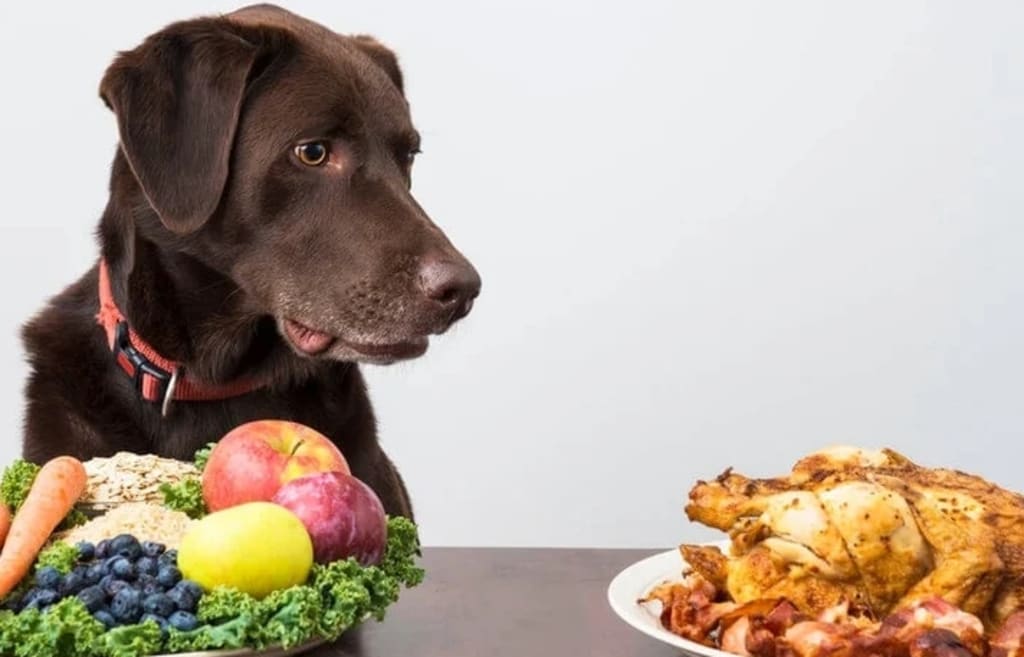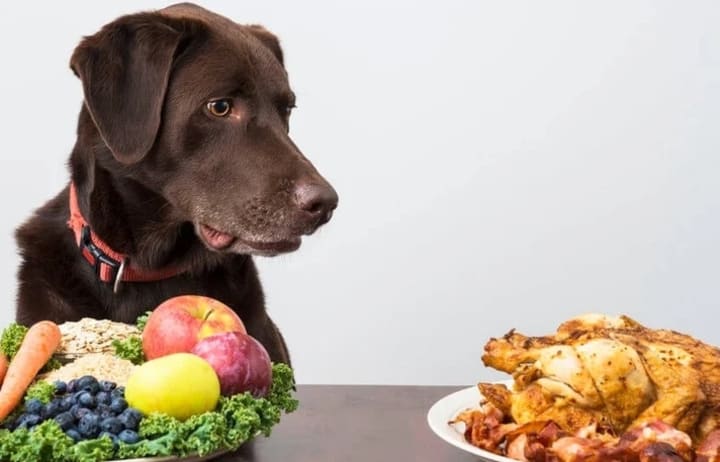Forced vegetarianism on pets is a kind of maltreatment.
Forced vegetarianism on pets is a kind of maltreatment.

Dogs are said to be man's best companion. So, how did they get to be our pals?
Dogs were tamed from wolves thousands of years ago, according to popular belief. By eating human food, the less hostile wolves located around human settlements survived longer than their wild counterparts.

Gradually, the offspring of this became more docile, eventually evolving into dogs. They evolved from carnivores to omnivores like humans as a result of eating human food.
Hundreds of millions of dogs are kept as pets around the world. Dogs have evolved from early foes of people to cute "hairy children" as a result of their taming process. Food is one of the crucial links.
Eating is a huge deal for all creatures, not just humans. Of course, the food you eat is also very significant.
Dogs, like people, have their own preferences in terms of what they eat. Some dogs, for example, enjoy drinking yoghurt and eating bitter gourd... People, on the other hand, can eat whatever they like, while dogs' diets are determined by how their owners feed them.
Some pet owners will carefully select a range of commercial pet food; others will prepare food at home; and still others will feed their pets the same food they do, but with special attention to seasoning (they cannot eat salty).
A thousand pet owners may use a thousand different feeding strategies, and many individuals today opt to feed their animals vegetarian meals. A study published in the journal "PLOS ONE" not long ago suggested that dogs who consume a vegetarian diet are healthier.
Is it possible for dogs to be vegan?
The study, lead by University of Winchester professor Andrew Knight, examined 2,500 dogs and discovered that vegetarian canines need less drugs and veterinary visits than meat-eating, standard omnivorous diet dogs. Dogs on a meat-based diet appear to be less healthy than dogs fed a vegan diet.
Most people are familiar with vegetarianism, but there are many different types of vegetarianism: some people don't eat animal foods (meat from livestock and poultry, eggs, aquatic products, milk and its products), while others are "lacto-vegetarians," who eat milk and its products; "ovo-lacto-vegetarians," who don't eat animal foods but eat eggs and milk; and "vegans," who don't eat any animal foods.

The study discussed "vegan diets," or a vegan diet, which is also the strictest vegetarian diet.
Is it really safe to provide a vegan diet to dogs?
Whether this study is reliable?
According to statistics from a survey of 2,596 dog guardians, around 54 percent of the 2,639 dogs were fed traditional meat, 33 percent were fed raw meat, and 33 percent were fed vegan meat in a study led by Professor Andrew Knight. approximately 13%
Based on expected veterinary assessments, the researchers also looked at the prevalence of 22 different health disorders. Around 49% of dogs with health issues were fed conventional meat, 43% were fed raw meat, and 36% were vegan.
Furthermore, research has indicated that a raw beef diet has a number of risks, including nutritional deficits or imbalances, as well as disease susceptibility. The study showed that a nutritionally adequate vegan diet is the healthiest and least harmful diet for dogs.
Although such a research derivation procedure appears to be without flaws, the research itself contains numerous flaws.
The study's sample size is adequate, with 2,639 dogs participating. However, data on dogs and their owners comes from online surveys that rely on quantitative data and dog guardians' opinions.
While veterinary clinical examinations and assessments of an animal's health are frequently more trustworthy than a guardian's judgement alone, the vast number of animals involved makes research costly and outstrips research funding.
As a result, researchers must rely on other markers of health. The guardian must submit information on the seven general health indicators and the prevalence of specific health diseases in the previous year, as well as recollect the pet's diet and medical treatment in the previous year, during the investigation.
However, memory is not without flaws. Furthermore, the poll instructed the monitor to provide the best estimate or answer "not sure" if they couldn't recollect the information. Furthermore, guardians participating in the study must have taken their pet to the veterinarian at least once in the previous year and trust the veterinarian's diagnosis.
Age, sex, spay status, and breed can all have an affect on a dog's health, but the researchers decided not to look into the effects of these extra characteristics. Because of concerns that the limited size of the breed population might limit the ability to statistically assess following results, it was finally decided not to discriminate by breed in this study.
This initiative is supported by "ProVeg International," which has previously invested in a vegetarian dog food firm and has a purpose to reduce global animal consumption by 50% by 2040.
From the study's object to the study's technique, and even the study's objective and motive, it's clear that this study has some limitations. In terms of reliability, the findings of this study appear to be a little shaky.
What level of vegetarianism is required for a dog? ******
Giving animals a vegetarian diet will elicit much debate, and it is in fact tied to the growing number of vegetarians. They want their dogs to be vegetarians as well as practising vegetarianism themselves.
People, as we all know, require a range of nutrients on a daily basis: protein, fat, carbohydrates, vitamins, minerals, water, and fibre, therefore choose a variety of foods to maintain a healthy nutritional balance. If you just eat vegan, you're likely to be deficient in certain nutrients, such as protein, which comes from meat.
Some animal foods, such as protein supplements made from plants like soy, provide nutrients that can be supplemented by vegetarians. As a result, it is not necessary to eat vegan; rather, it is necessary to maintain good health and pay attention to nutritional balance, as there are some nutrients that a vegan diet cannot give or has insufficient supply of, such as iron, calcium, vitamin D, vitamin B-12, and so on. Additional supplements should be considered.
Humans are omnivores, meaning they can eat whatever they choose, whether they're vegetarian or not. With pets, however, this is not always true.
Cats, unlike humans, are carnivores: niacin, taurine, arginine, and other nutrients are nearly exclusively obtained through diet, particularly meat, according to various studies. Furthermore, the cat's intestine is quite short, indicating that its digestion period is very short, which is unusual for plant food, which takes a long time to digest. As a result, vegetarians should avoid cats.
"There is a lot of current research in the subject of vegan diets for dogs, and this study adds to the evidence for its benefits," said Justine Shotton, president of the British Veterinary Medical Association, in response to Professor Knight's findings. However, there is still a scarcity of reliable information on the long-term vegan diet. The health ramifications of feeding a vegan diet in significant amounts to dogs have been highlighted, therefore we're interested in seeing more studies to see if this can suit dogs' long-term dietary needs."
"Although we do not encourage it, it is technically conceivable to feed dogs on a vegetarian diet (vegetarian diet), but dog owners must seek veterinarian guidance to avoid dietary deficits and related disorders," Shotton added.
It's worth noting that this refers to a vegetarian diet for dogs, not the vegan diet specified in the study. Other study studies claim that feeding a vegan diet to dogs does not provide them with a balanced amount of accessible nutrients, is prone to vitamin B and D deficiency, and may cause malnutrition due to the body's inability to digest significant amounts of plants.
It is clear that eating vegan is not recommended for dogs who are omnivores like people. However, this is not difficult; if you supplement other nutrients while eating vegan, you can stay healthy no matter what kind of diet you follow.
Professor Knight's study also found that among the 2,596 respondents who chose a pet's food, one of the most significant aspects was pet health.
In addition to considering the dog's health, the dog's thoughts should also be considered.
Many people believe that dogs are intelligent creatures, and tests have revealed that they have an IQ level comparable to that of a young child. Many people treat pet dogs as children or companions because they are referred to as "hairy children."
No matter how you define your relationship with your pet dog, they will have their own desires because they are individuals unlike humans. Dogs should be able to make their own decisions about whether or not they want to go vegan.
Vegetarians can choose to be vegetarians, but they cannot force others to do so. Dogs should not be "forced" to eat vegetarian food for any reason.
You can try it if you want your dog to be a vegetarian. There are also a variety of vegetarian dog foods available. They don't speak English, but there's always a way to say whether the food is good or bad, whether you enjoy it or not.
Some people believe that dogs, like children, are unhealthy if they only eat what they like and detest. If this is the case, individuals can be instructed in dietary patterns that balance nutrients for their health.
Everyone has the freedom to eat however they like, but when it comes to a pet dog with a certain affiliation, it is extremely wrong to choose a feeding pattern for it, especially when it goes against the eating pattern that has evolved through time.

People select vegetarian meals for a variety of reasons, including the concept, the health of their bodies, and their religious beliefs. Dogs have modified their dietary habits to live for tens of thousands of years. Although it is possible that some dogs are vegetarian for health reasons, the majority of dogs are vegetarian because their owners want them to be.
There may be dogs in the world who desire to be vegetarian and must be vegetarian in order to preserve their health and nutrition, but dogs should not eat vegetarian simply because their owners are vegetarians.
About the Creator
Enjoyed the story? Support the Creator.
Subscribe for free to receive all their stories in your feed. You could also pledge your support or give them a one-off tip, letting them know you appreciate their work.






Comments
There are no comments for this story
Be the first to respond and start the conversation.